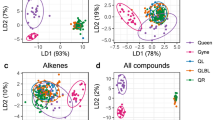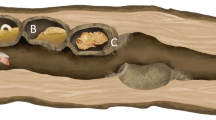Summary.
Queens in colonies of the small myrmicine ant, Leptothorax gredleri Mayr 1855 (Hymenoptera, Formicidae) engage in dominance interactions and form social hierarchies, in which typically only the top-ranking queen lays eggs. Occasionally, queen antagonism escalates to violent mandible fighting, during which the sting is used to apply Dufour gland secretions onto the cuticle of the opponent. Contaminated queens often are attacked by nestmate workers. Here we show that the chemical composition of the Dufour gland is colony-specific and that workers can discriminate between secretions from their own and other colonies. Our findings suggest that Dufour gland secretions are involved in the establishment of hierarchies within a colony. When invading an alien colony the queen presumably employs the secretions during the expulsion of the resident queen. Apparently, Dufour gland secretions play a role in intraspecific queen competition similar to that in slave-making and inquiline formicoxenine ants, where they function as "propaganda substances" in an interspecific context.
Similar content being viewed by others
Author information
Authors and Affiliations
Additional information
Received 7 July 1998; accepted 15 September 1998.
Rights and permissions
About this article
Cite this article
Heinze, J., Oberstadt, B., Tentschert, J. et al. Colony specificity of Dufour gland secretions in a functionally monogynous ant. Chemoecology 8, 169–174 (1998). https://doi.org/10.1007/s000490050022
Issue Date:
DOI: https://doi.org/10.1007/s000490050022




